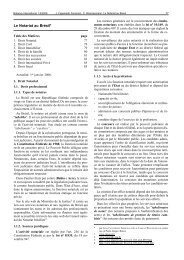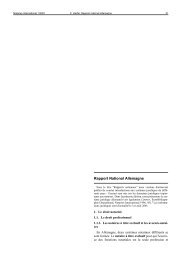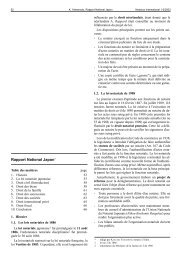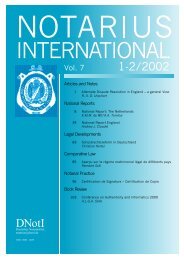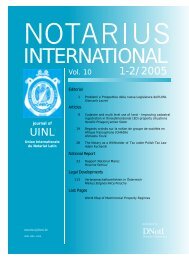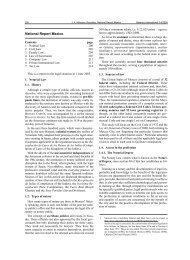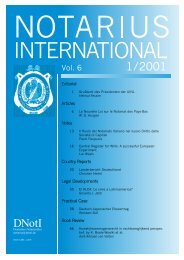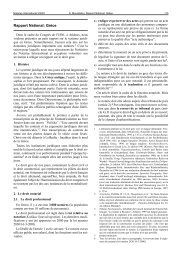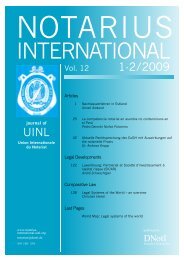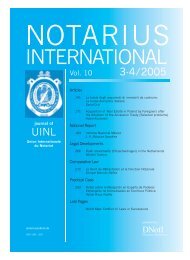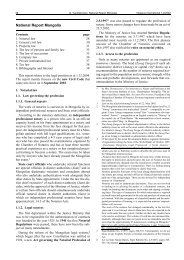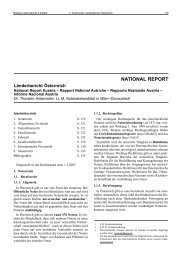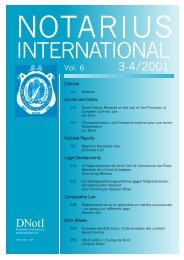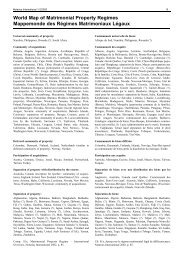ARTICLES and NOTES - Notarius International
ARTICLES and NOTES - Notarius International
ARTICLES and NOTES - Notarius International
You also want an ePaper? Increase the reach of your titles
YUMPU automatically turns print PDFs into web optimized ePapers that Google loves.
<strong>Notarius</strong> <strong>International</strong> 3-4/2002 T. Antenreiter, National Report Austria 147<br />
ty is carried out 121 . Under Austrian law the domicile theory<br />
(Sitztheorie) thus applies in principle (<strong>and</strong> not the incorporation<br />
doctrine – Gründungstheorie).<br />
But nevertheless the question arises as in other EU<br />
states as to the compatibility of the domicile theory with<br />
European law, in particular freedom of establishment<br />
(Niederlassungsfreiheit). That is why the Supreme Court<br />
of Austria has given up the domicile theory regarding<br />
companies incorporated in other EU states 122 .<br />
7.7. Apostille<br />
Austria is a signatory to the Hague Convention on<br />
Abolishing the Requirement of Legalisation for Foreign<br />
Public Documents of 5.10.1961, <strong>and</strong> for this reason<br />
an Apostille is sufficient for the recognition of notarial<br />
documents from other contracting states <strong>and</strong> no additional<br />
certification is stipulated.<br />
8. Tax law<br />
8.1. Property transfer tax<br />
Property transfer tax (Grunderwerbssteuer) is levied<br />
on business transactions involving immovable property<br />
(in particular purchase <strong>and</strong> exchange), but not, however<br />
on acquisition by inheritance or on gifts.<br />
The property transfer tax amounts in principle to<br />
3.5% of the purchase price (the consideration), but in the<br />
area of close family relationships it amounts to only<br />
2% 123 . (The statutory registration fee for the L<strong>and</strong> Register<br />
amounts to 1%.)<br />
There are two possible ways of computing the tax: either<br />
this is done by way of electronic self-assessment by<br />
notaries (<strong>and</strong> other places set up for this purpose) <strong>and</strong><br />
then paid to the Tax Office in the name of the contracting<br />
parties or the taxable transaction is (as a rule likewise<br />
electronically) notified to the Tax Office, which calculates<br />
the tax <strong>and</strong> sends a direct order to the parties. The<br />
declaration of self-assessment of the tax or the fiscal<br />
clearance certificate issued by the Tax Office in the second<br />
case is a necessary precondition for registration in<br />
the L<strong>and</strong> Register.<br />
In the notary’s practice today the overwhelming majority<br />
of all business transactions are already self-assessed<br />
electronically over a separate Internet interface<br />
with the Tax Office (FINANZ online) <strong>and</strong> the tax is forwarded<br />
to the Tax Office in the name of the parties. In<br />
this situation the notary does not incur any liability for<br />
the accuracy of the contents of the tax computation, but<br />
does have strict liability for the timely paying of all selfassessed<br />
taxes <strong>and</strong> fees 124 .<br />
8.2. Inheritance tax<br />
Acquisition by inheritance <strong>and</strong> gratuitous donations inter<br />
vivos are subject to taxation under the Inheritance<br />
Tax Law (Erbschafts- und Schenkungssteuergesetz). The<br />
calculation of the tax is structured so as to be doubly<br />
progressive in accordance in the first place with the<br />
closeness of the familial relationship (tax classes I to V)<br />
<strong>and</strong> in accordance with the value of the donation 125 . For<br />
example, the tax in tax class I (spouse <strong>and</strong> children)<br />
amounts in the case of a donation of up to 7.300,– € to<br />
2% <strong>and</strong> of donations of over 4.380.000,– € to 15 %, <strong>and</strong><br />
in tax class V (no relationship) in the case of a donation<br />
of up to 7.300,– € to 14% <strong>and</strong> of donations of over<br />
4.380.000,– € to 60 %.<br />
In the case of acquisition of real property there is provision<br />
in addition for a property transfer tax equivalent<br />
amounting to 3.5% (2% in the case of close relatives) 126 .<br />
For persons in tax classes I <strong>and</strong> II there is a tax-free sum<br />
amounting to 2.200,– € for tax classes III <strong>and</strong> IV of<br />
440,– € <strong>and</strong> for tax class V of 110,– €.<br />
Acquisitions by inheritance of assets subject to withholding<br />
tax as the final tax (endbesteuerte Vermögen) are<br />
totally exempt from tax; this includes, in particular, credit<br />
balances at banks subject to withholding tax (accounts,<br />
savings deposits, security deposits etc). Up to the end of<br />
2003 gifts inter vivos of cash deposited with an Austrian<br />
bank are also totally exempt from tax in tax classes I<br />
to IV <strong>and</strong> in tax class V there is a tax free sum of<br />
100,000,– €.<br />
In Austria a tax liability arises if the deceased at the time<br />
of death was an Austrian national or resident (Inländer)<br />
or, in the case of gifts, the transferee is an Austrian national<br />
or resident. Those qualifying as “Inländer” include Austrian<br />
citizens, foreigners domiciled or having their habitual<br />
residence in Austria <strong>and</strong> legal entities with their registered<br />
offices in Austria 127 . Along with the taxpayer any<br />
person who has safe custody of the deceased’s estate or the<br />
gifted item or any part thereof incurs personal liability for<br />
the payment of the inheritance tax 128 if appropriate security<br />
in respect of the tax was not provided. For this reason it<br />
is usual for Austrian notaries, who as Court Commissioners<br />
frequently hold assets in safe custody for the estate or<br />
the heirs, as a rule only to h<strong>and</strong> over funds to foreign beneficiaries<br />
after full payment of any tax due.<br />
Austria has concluded are several bilateral treaties (also)<br />
concerning double taxation of the estate, such as<br />
with Liechtenstein 129 , Switzerl<strong>and</strong> 130 , France 131 , Sweden<br />
132 , Hungary 133 , the U.S.A. 134 <strong>and</strong> with Germany 135 .<br />
These treaties do not regulate what is taxable, but limit<br />
the taxation by either state. Thus, these treaties divide<br />
the possible taxation among the states concerned which<br />
then apply their domestic tax law to regulate the tax applicable<br />
to the specific case.<br />
121 Art. 10 IPRG (Private <strong>International</strong> Law Statute)<br />
122 See in this regard: Hertel, National Report Germany, <strong>Notarius</strong> <strong>International</strong><br />
, p. 20, 30 (no. 7.5 - Centros decision of the European Court)<br />
123 Art. 7 Property Transfer Tax Law<br />
124 Arts. 10 to 16 Property Transfer Tax Law<br />
125 Arts. 7 <strong>and</strong> 8 Inheritance Tax Law<br />
126 Art. 8 para. 4 Inheritance Tax Law<br />
127 Art. 6 Inheritance Tax Law<br />
128 Art. 13 para. 4 Inheritance Tax Law<br />
129 BGBl 1956/214<br />
130 BGBl 1975/63<br />
131 BGBl 1994/614<br />
132 BGBl 1963/212<br />
133 BGBl 1976/51<br />
134 BGBl 1983/269<br />
135 BGBl 1955/220



